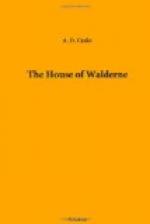The “merrie men” knew their bold captive.
“Ah! How is this? What ox hast thou felled?”
“Only a butcher who came in to slay me, but I avoided the blow, flew suddenly at his wrist and mastered the weapon, when I gave him what at Oxford we called quid pro quo, as we strewed the shambles with boves boreales.”
They did not understand his Latin, but they knew Marboeuf, who, as the reader will comprehend, seeing all was lost, had striven to perform his vow, and happily had begun first with this dexterous young knight. Hence they found the poor mayor of Hamelsham safe and sound, only a little less afraid of the “merrie men” than of Drogo; for often had they rifled the castle and robbed the hen roosts of his town.
But all their efforts failed to open Martin’s door, and they were at their wits’ end what to do. They heard a rumour that the battle was lost, so they set men to watch, and prepared an ambush in his own caste yard for Drogo, in case he should survive the fight and come to hide, with especial instructions to take him alive, as they intended to hang him from his own tower.
Meanwhile, through the dewy night, amidst the thousand odours of the woods, rode Hubert and his fifty horsemen. They stayed not for brake, and they slacked not for ford. All the loving heart of Hubert went before him to the rescue of the friend of his boyish days; suffering, he doubted not, cruel wrong and unmerited imprisonment in a noisome dungeon. And ere the midnight hour he arrived amidst the familiar scenes, and saw at length the towers rise before him in the faint light of a new moon.
The sound of his horses must have been heard, but no challenge of warder awaited them. When the party arrived they found the drawbridge down, the gates open. What could it mean?
“It may be treachery. Look to your arms ere you ride in,” cried Hubert.
They entered the court through the gateway in the Barbican tower. Instantly the gates slammed behind them, the portcullis fell, and, as by magic, the windows and courtyard were crowded with men in green jerkins with bended bows.
“What means this outrage,” cried Hubert aloud, “upon the heir of Walderne as he enters his own castle?”
“That you are in the power of the merrie men of the greenwood. If you be Drogo of Walderne, surrender, and spare bloodshed: all who have never harmed us to go free.”
“Then are we all free. My men are from Kenilworth, and can never have harmed you in word or deed. As for Drogo, he fell by my hand this day in fair combat.”
“Who art thou, then?”
“Hubert, son of Roger of Walderne, and I seek my brother Martin—Friar Martin—whom you all must know.”
Instantly every hostile demonstration ceased. The doors were thrown open, and the men who, a moment before, were about to fly at each other’s throats, mingled freely as friends.
“Martin is below,” they said. “Have you smiths who can force a door?”




